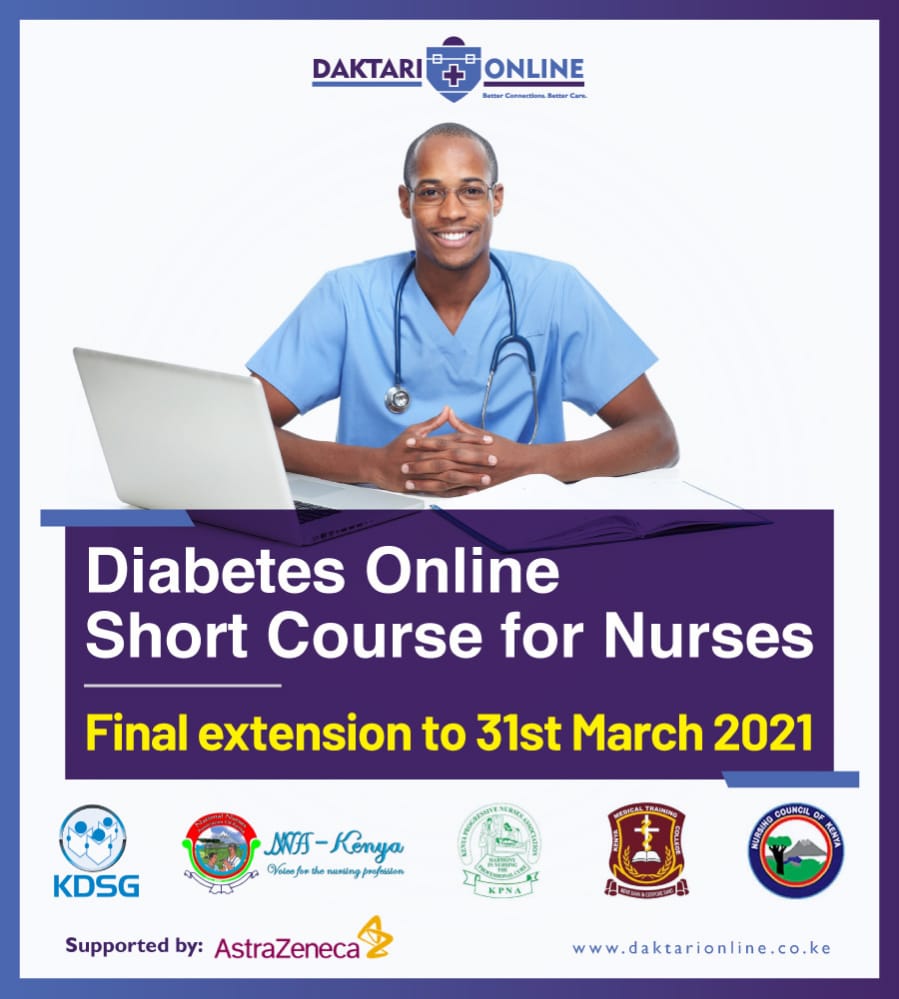
Some of the happy early memories I have of my childhood are of myself looking for papers to read. A little chubby girl reading pieces of old newspaper that had been used by the shopkeeper to wrap the slice of soap she just bought. A bemused girl using a new word from the newspaper in her compositions. One of those words was ‘malicious.’ I did not know what it meant since we owned no dictionary. I thought it meant a kind person. So, when the composition asked us to describe our best friend, I happily wrote that she was beautiful and malicious. She forgave me.
I have always gone after new information since then. Nursing offered me a chance to be both artistic and creative with my search for information. Lately my focus has been on non-communicable diseases especially diabetes and kidney disease. I have been reading and teaching what there is to read and teach about diabetes and kidney failure. Either separately or together. Why because diabetes does cause kidney failure, yet it is not the only cause of kidney failure.
The International Diabetes Federation (IDF) has projected a very worrisome trend in diabetes prevalence. In 2019, 4.2 million deaths globally were attributed to Diabetes. In Africa, a continent that has largely been ignored in the matters of non-communicable diseases, the prevalence of diabetes is at a staggering 8.4%. The IDF further observes that the cases of diabetes were more in urban areas compared to the rural areas. Kenya is in the early stages of urbanization of every rural town in the country. These figures are meant to only increase. We cannot be blind to the fact that data in the African region is erratic. Ergo, these figures from the IDF may not paint a true picture on the ground.
In the current era of information, healthcare workers must be abreast with new trends and practices in the field of diabetes. As a nurse with a keen interest in diabetes and kidney disease among other lifestyle diseases, the course from Kenya Diabetes Study Group (KDSG) was a blessing in disguise. Covid-19 has made it mandatory that we embrace online learning. Daktari Online is that platform and then some.

It is quite unfortunate that few if any, healthcare workers are fully skilled in the current field of diabetes management. What most of us we practise in the clinical settings is what we learnt several years ago in medical and nursing schools. We need to be at par with the dynamism of diabetology.
Patients have gone into details to understand their conditions. I am always encouraging the public to be inquisitive about their own health. I would be a fool to imagine that they do not listen. It would be a shame that as a nurse or doctor a patient may confront you with new information about diabetes which you are not aware of. That makes them either lose confidence in you or makes you feel like the bottom of a smelly shoe. At least that is what I would feel. The Diabetes online Course from KDSG offers you the correct information such that you know what to tell patients and how to pick out fake news and advise them against it.
The onus is ours then to keep our knowledge and skills up to date. One patient recently spoke to me about reversal of type 2 diabetes. Had I not enrolled for this course, I would have dismissed him telling him that type 2 diabetes is a lifelong disease.
This is what most clinicians believe. That once type 2 diabetes sets in, it will always be there. Yet studies have been ongoing as early as 2000 and earlier about the reversal of type 2 diabetes. Many have been conditioned that diabetic ketoacidosis as an acute complication of diabetes only occurs in type 1 diabetes. Others believe that insulin cannot be used in type 2 diabetes.
There is an acute knowledge gap in what nurses know and what they practise with regards to diabetes care. I say nurses because of their exposure and contact time with the patient. Nurses because they are patient advocates. However, do not get me wrong, this course is for all healthcare practitioners.
Perhaps the importance of nurses in diabetes prevention and management is why the United kingdom has provided funding aimed at a master’s degree in diabetes nursing. A Diabetes Specialist Nurse in the United Kingdom is not only a clinical educator but also a policy auditor. This initiative speaks of the commitment of the government of United Kingdom to stop diabetes. Case in point, the largest trial of reversal of type 2 diabetes was conducted in Newcastle, United Kingdom.
Further, most of the facilitators of this Diabetes Online Course trained at some point in the United Kingdom. From the diabetes dietician to the chief diabetologist. They all have a history of studying diabetes in the United Kingdom. These are just examples of the things that can be done at a policy level to influence how we deal with diabetes.
Granted, there may be little we can do about type 1 diabetes now that it is insulin dependent. However, there is a lot to be done to prevent complications of the same. Type 2 diabetes on the other hand can be prevented. KDSG has been quite explicit in linking lifestyle to type 2 diabetes. As Africans, we are genetically predisposed to contracting type 2 diabetes. If we have a family history of diabetes, the risk increases even further.
Nurses need to know what to look for at the point of contact with every patient so as to tailor the education to fit the patient’s needs. To study a diabetes management course comes at a price. There is no university in Kenya at the moment that is focusing on diabetes education which is pitiful if you ask me. I mean, we have a rickety health system and instead of zeroing in on prevention and education about illnesses we are keeling over, figuring out about management.
Emphasizing on the prevention of preventable illnesses, reversing those we can and generally improving our wellbeing is a sure way to leave the hospitals for only acute illnesses. That way we free up hospital beds. We prevent eye complications, we prevent chronic kidney disease and ultimately, stop heart disease which is the biggest killer in type 2 diabetes.
This course comes at no cost to the nurse. It is easily sectioned to suit your work-family balance. This is a course you access by the tap of a button. You only need a book and a pen. You will need the notes.
I am studying Diabetes as a whole module at the university of Derby and this course has been a good way to supplement my learning. For student nurses or other medical students, this course is a life saver.
I know that the course expires on 31st March 2021 but your demand for the same could see it extended to the end of April. All you need to do is fall in love with knowledge acquisition.
I could write forever about diabetes, but talk is cheap. Register and start this course today. Here is the link

I love the article. Keep up the good work. Proud of you Cate!
Nice place to be
Very educative
Great information i have learnt something did not know can we again have the course for us who we missed thanks